After watching a recent George Gammon video on what might happen to real estate prices during this crisis, I thought it will be nice to do an analysis of how Singapore's property prices were affected by past recessions. Hopefully through this exercise, I will be able to understand what may happen to the property market during this recession.
In Singapore, there are largely 2 types of properties. The HDB flats/apartments are public housing that are built and subsidized by the government. These properties are only meant for Singapore residents and it is important to note that only the first purchase is subsidized and subsequent resale will be based on market prices. As of now, over 80% of Singaporeans stay in HDB apartments.
The other segment of the market is of course the private properties which anyone is free to purchase.
HDB Resale Price Index
With the data provided by SingStat, I plotted the following chart with the HDB resale price index in blue and the Singapore population (residents only) in orange. The areas in grey are the periods of recession.
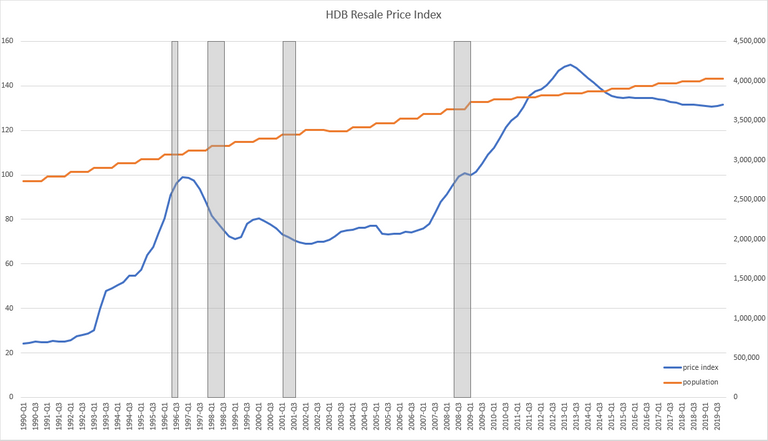
As you can see from the chart, Singapore's population has been on a steady climb. Naturally, with rising population, there will be rising demand for housing. As shown in the chart, the price index is also on a rising trend over the years.
Private Residential Property Price Index
Let's now look at the chart of private properties. Similarly, the orange line is the population growth and the blue line is the property price index. The grey areas are again the periods of recession but we have more data for private properties stretching all the way back to 1975.
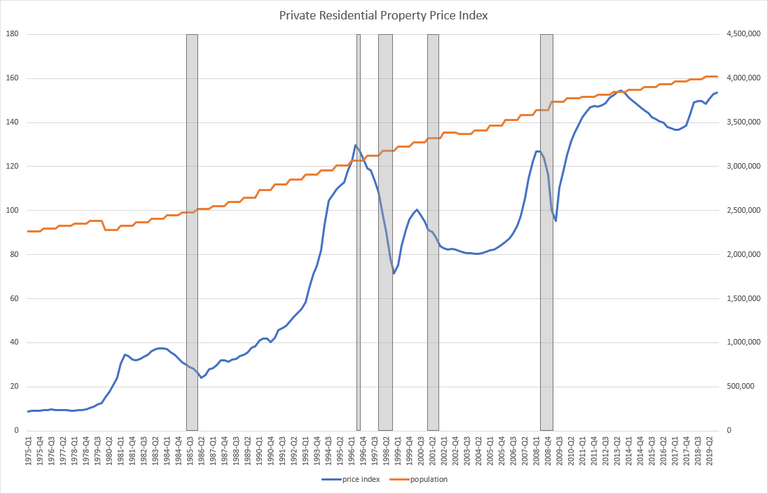
Similar to the HDB resale price chart, the price trend is overall upward sloping. However, the price seems to be much more volatile than that of the HDB resale market.
Analyzing the charts
Volatility
The private property price index is clearly more volatile than the HDB resale price. I think that can be largely explained by the fact that HDB apartments are highly regulated by the Singapore government. There are many restrictions such as the 5 year minimum occupation period, rental rules and others. In addition, foreigners are also not allowed to own HDB apartments. As such, the HDB resale market is less influenced by the financial environment outside Singapore.
Furthermore, over 80% of Singaporeans stay in HDB apartments and most of them have only 1 property. Since these HDB apartments are meant for shelter and not for investment, they are more resilient to volatility as a result of recessions or external factors.
On the other hand, the private property market is open to foreigners and is less regulated. It is also a market which wealthy Singaporeans participate in and they are more likely to treat these private properties as an investment. Hence, the market reflects and probably amplifies the effect of economic booms and busts.
Markets tend to bottom after long recessions
In the following charts, I marked out areas post-recession that are good entry points if you are keen in investing in the property market. Notice that such investment opportunities or market bottoms tend to come after a recession which lasts more than 2 quarters.
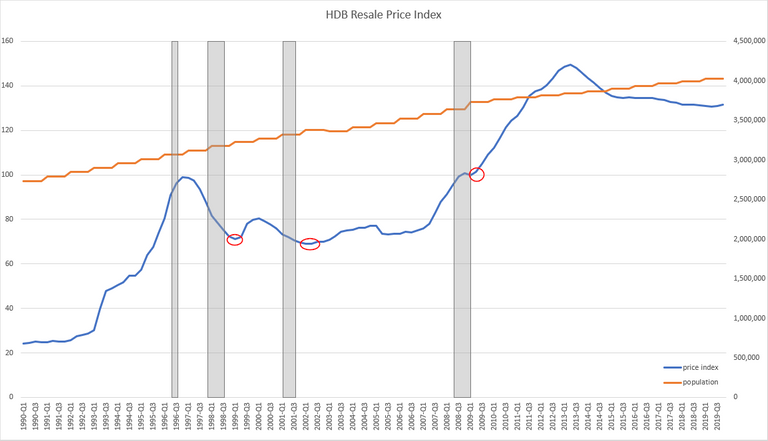
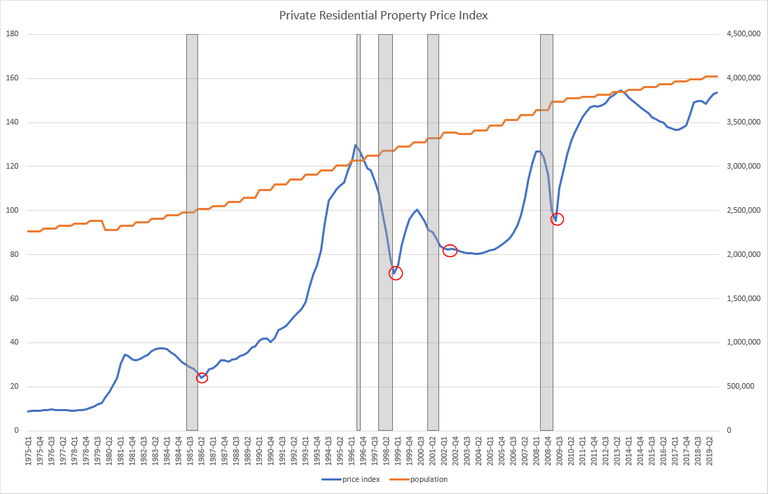
Again, due to the regulations in the HDB resale market, the opportunities are not so pronounced in that market.
Shelter versus real estate
In George Gammon's video, he mentioned that in this crisis, we have to differentiate between shelter and real estates. Shelter being basic housing which everyone still needs regardless of how bad the recession gets. Real estates being the more expensive properties that are mainly for investments.
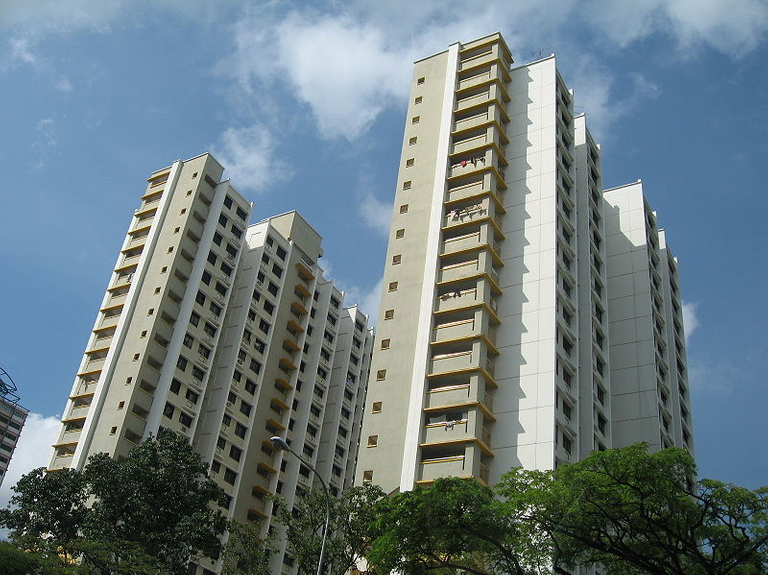
Source
I think in Singapore, the market segregation becomes very clear in that the HDB apartments are the basic housing or what George termed as shelters. While the private properties are the real estates that are more expensive and meant more for investments.
If you are interested, here is George's recent video.
The price dip in 2013/14
You might also notice the price dip during 2013/14 period, this is likely due to the cooling measures that the government implemented to prevent prices from rising too quickly.
The property market is the bedrock of the Singapore's economy and it is of the interest of the government to ensure that it does not get too expensive nor too low. The Goldilock kind of market is what the Singapore's government prefers.
My amateur prediction
As of now, it seems likely that Singapore will enter a prolonged recession of more than 3 quarters. The government had time and again mentioned that the impact of this pandemic on the economy will be great. In addition, Singapore also delivered a financial support package that is much bigger than that during the global financial crisis. This implies that this recession is likely to be deeper and longer than the one in 2008/09.
Given all these, my own prediction is that the private residential property market is going to take a huge hit. While it is hard to predict how low it will get, my guess is that it may go to the level during the 2008/09 recession. Based on past market behaviors, the bottom will come deep into the recession which will be the best time to buy.
As for the HDB resale market, I think it will also decline, but the drop will not be as much as the private property market.
This is a very simplistic analysis of the market and I know I am missing out a lot of other essential data points (e.g. the supply of properties, amount of foreign investments and etc). Hence, do take this analysis with a pinch of salt and always do your own research and due diligence when making any kind of investments. Finally, I also did a similar analysis on how Singapore's COE price may be able to predict a recession, do have a read if you are keen and I will be writing a follow-up piece on that topic very soon.
20% of post rewards goes to @ph-fund, 5% goes to @leo.voter and 5% goes to @peakd to support these amazing projects.
This current pandemic will definitely pull down a lot of economy.
That is right. Thanks for the comment
Hi
I'm new on this Hive platform. I will appreciate your Follow back and subsequent Upvote on my quality content.
If you hear a prediction, it is only a guess.........All my suppliers I manage are not working......Even when the machines and people get back to work, there is no way to predict delivery schedules, planes, trains and automobiles will be overwhelmed to get back in a routine. Logistics people will be stressed out, chain smoking their lungs out trying to understand when deliveries will occur, let alone worldwide supply chains returning to work at different times.........One word.......DEPRESSION
This article is shared on Twitter
#posh
Hi @culgin
Property markets will be bursting - mostly in countries where access to debt has been very easy for past few years. Places where most properties are purchased using morgages and loans.
ps. consider posting this content also on steemit :)
Yours, Piotr
Years of easy credit has brought about huge bubbles. Let's see how it will end.
p.s. Yes, I will post it on Steem as well. I am keeping a 1 day gap